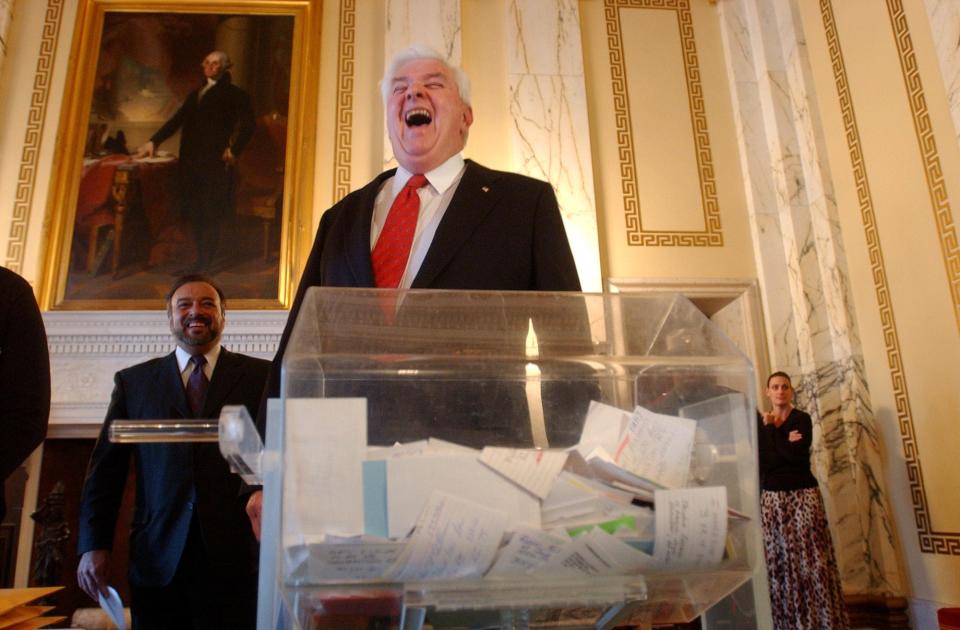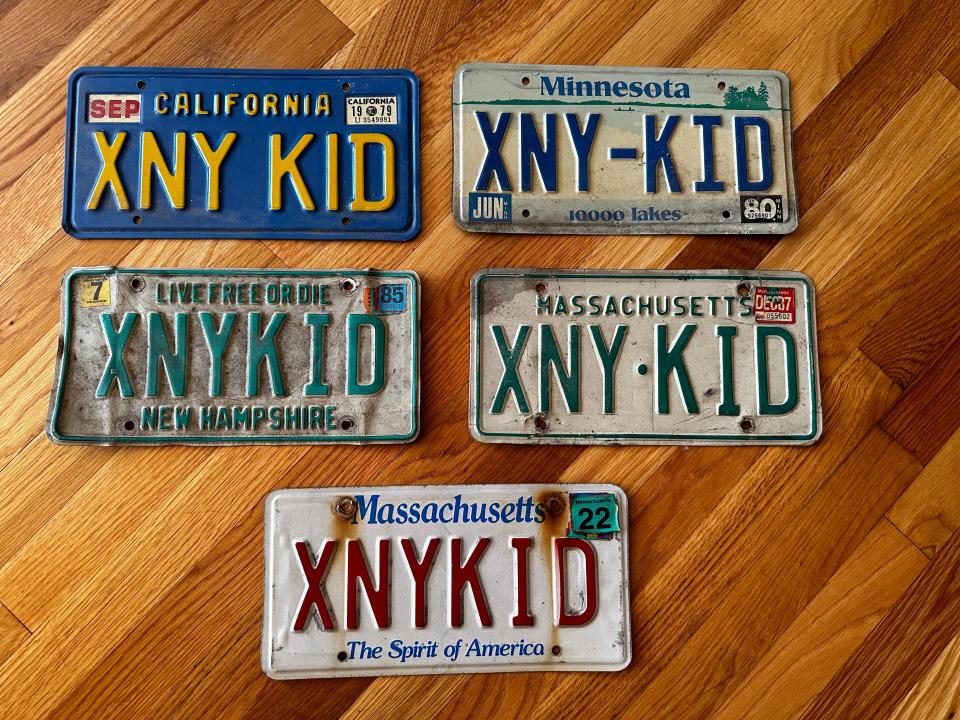RI's governor can give out low-numbered plates. Why won't the state tell us who has them?
A long succession of Rhode Island governors have doled out low-numbered license plates as favors to supporters, family members and well-connected insiders – or used them for political horse-trading.
So shouldn't the public be able to find out who's getting those coveted status symbols?
The Providence Journal thinks so. Gov. Dan McKee's administration disagrees. And Attorney General Peter Neronha's office sided with the governor on this one.
That’s one of two license-plate related developments that Political Scene is covering this week. Later in this column, we’ll also have an update on why it’s taking so long to bring back vanity plates.
![In 1986, Carmine Carcieri, a distant relative of future Gov. Donald Carcieri, paid Joseph McDevitt $25,000 to surrender Plate 7 to the Division of Motor Vehicles. Carcieri then made a special application to the DMV and got the plates. [Journal files]](https://s.yimg.com/ny/api/res/1.2/AL5PZlXbGYSYF9XUhCB7Ng--/YXBwaWQ9aGlnaGxhbmRlcjt3PTk2MDtoPTY2MA--/https://media.zenfs.com/en/the-providence-journal/08a8f1c75da72680b5494e3b6913d58b)
The fight for low-numbered plates
Low-numbered license plates – meaning any passenger, combination or commercial plates with four digits or fewer – are officially known as "preferred plates." They're assigned by the governor's office, not the Division of Motor Vehicles.
Back in June 2022, The Journal filed an Access to Public Records Act (APRA) request for a list of all individuals who'd been assigned a "preferred plate" in the previous 18 months. That time frame would include anyone who received one in the final months of Gov. Gina Raimondo's administration or during McKee's first year in office.
The governor's office denied that request, so The Journal's lawyers appealed to the attorney general's office, which issued a decision in favor of the McKee administration in June. LMG Rhode Island Holdings Inc., publisher of The Providence Journal, has since filed a Superior Court complaint against the ruling.
The legal back-and-forth has been somewhat wonky. Essentially, the governor's office claims that the federal Driver’s Privacy Protection Act prohibits the office from handing over the list. But The Journal's attorneys argue that it only applies to state DMVs, not to the governor's office.
The law "was not intended to provide agencies carte blanche to withhold from public access any information it collects, so long as such information is (a) in any way 'connected to' an individual’s motor vehicle registration and (b) forwarded to the DMV for processing," states The Journal's complaint, filed in September.
License plate lookup: These are all the vanity plates in Rhode Island
The McKee administration contends that the law does apply, because the governor's office performs "certain DMV functions" when it comes to low-numbered license plates.
With preferred plates, the DMV "subcontracts a small portion of its overall motor vehicle registration operation to the governor’s office," legal counsel Claire Richards wrote in response to The Journal's complaint to the attorney general. "As such, the governor’s office – when it performs these functions – is acting as an agent or subcontractor of the DMV."

Why the AG rejected the appeal and The Journal is going to court
The AG's office, which hears public-records appeals, concurred that "with respect to this category of license plates, the governor’s office effectively stands in the shoes of the DMV."
"Despite the fact that this practice has been in existence for over thirty years, neither party has pointed us to any statutory authority or DMV regulation that clarifies the Office of the Governor’s authority to issue these plates, and we found none," states the decision. "But the propriety or wisdom of the preferred plate program is not within the purview of this office’s review under the APRA."
Authored by Assistant Attorney General Katherine Sadeck, the decision goes on to say that withholding the records was consistent with the intent of the federal privacy law.
The Journal's attorneys are now seeking a court ruling that would compel the McKee administration to hand over the list – and cover the paper's legal fees.
Even if the Driver’s Privacy Protection Act does apply to the governor's office, the specific information that The Journal is seeking "is not the type of information protected from disclosure under the DPPA," states the complaint filed in Superior Court by attorneys Stephen M. Prignano of McIntyre Tate and Michael J. Grygiel and Kelly McNamee of Greenberg Traurig.
As the complaint notes, The Journal did not request information such as addresses and Social Security numbers – only a list of names.
Disclosing those names "would serve an important public interest by providing Rhode Island citizens insight into an opaque process facilitated by the state’s highest elected official that appears to favor the politically well-connected," it argues.
Vanity plates also remain elusive
If you can't get a low-numbered license plate, you can always pay for a custom vanity plate. Right?
Wrong. Nearly three years have passed since the DMV stopped accepting new applications. Officials are now suggesting that orders will reopen by 2025, while acknowledging that vanity plates previously weren't a priority.

Jane Epstein, who lives in Cranston, is among those who are growing increasingly frustrated.
"It's ridiculous," she said. "I've had the same license plate since 1977. This would have been my fifth state."
Epstein grew up in New York and later moved to California, where she first got the plate XNY KID – as in, ex-New York kid. Subsequent moves brought her to Minnesota, New Hampshire and Massachusetts, where she claimed the same combination.
Last year, she and her husband moved to Rhode Island. Since the DMV wasn't issuing new vanity plates, she had to give up hers.
After more than 40 years driving around as XNYKID, she now has trouble finding her car or remembering her license plate number. And her friends don't recognize her car the way they used to.
"That's how people know me," she said.
DMV says vanity plate rules 'were not a priority'
Vanity plates might not be the most pressing issue facing Rhode Island, but the prolonged freeze does mean that the state is missing out on revenue, and it's been hard to understand what's behind the delay.
Consider this: In 2014, the New Hampshire Supreme Court struck down that state DMV's broad policy of rejecting vanity plates that "a reasonable person would find offensive to good taste."
Vanity plate applications were temporarily put on hold while the New Hampshire DMV came up with new rules, which took only two weeks.
A similar scenario played out in Rhode Island in February 2021 when a federal judge struck down the DMV's vague policy of prohibiting license plates that "might carry connotations offensive to good taste and decency."
But two years and 10 months have passed since then, not that anyone's counting. The DMV still hasn't adopted a new set of regulations and still isn't issuing vanity plates.
So what's taking so long?
"The court case was decided in the middle of the pandemic," DMV spokesman Paul Grimaldi wrote in an email. "Our primary goal was to maintain operations for all daily transactions, expand on line services, provide a safe environment for in-person transactions."
"Vanity plate rules and regulations were not a priority," he continued. "Now that the pandemic is for all intents and purposes behind us, we have begun working on the new rules and regulations."
More: Will RI start issuing vanity plates again? DMV and McKee not responding to questions
Almost 3 years down, but at least one more to go
Back in October 2021, Grimaldi told The Journal that the DMV was reviewing public comments and planned to present McKee with possible options for a new vanity plate policy "within the next couple of weeks."
Last month, DMV administrator Walter "Bud" Craddock told WJAR that vanity plates could be back "within a year to 18 months at most."
"I’ve got the first draft of regulations that we are going to start reviewing in a little more detail,” he said.
In other words, it took two years to get a first draft. And it will be at least another year before vanity plate applications reopen, if not longer. (The draft is done but remains "a work in progress," Grimaldi told The Journal.)
The delay would be easier to understand if Rhode Island were alone in trying to strike a balance between public decency and free speech.
But other states have faced this same dilemma and come up with policies that outline what you can and can't put on a license plate. The American Association of Motor Vehicle Administrators even publishes guidelines for best practices. (Among them: Have a review committee made up of "a diverse group of individuals" weigh in on all requests.)
Do we really need to reinvent the wheel here?
"There is no existing single policy that our legal team feels would be a solution in light of the court cases," Grimaldi said. "They have had to take information from several states in working towards a solution for Rhode Island."
What happens now?
According to DMV officials, adopting a new vanity-plate policy won't require the General Assembly to pass legislation.
Instead, the regulations will go through the rule-making process for government agencies.
In an interview earlier this month with WPRO's Gene Valicenti, Craddock indicated that the DMV is required to solicit public comment as part of that process, which is one reason it will take "at least another year."
The DMV and its lawyers also "have to pay attention to what other states are doing" and how those policies are faring in court, he said. (South Dakota, for instance, was recently sued over the vague wording in its policy.)
Vanity plates previously generated at least half a million dollars in revenue each year. The state isn't passing up all that money, since drivers with existing vanity plates still have to pay $120 to renew them every two years. But it is missing out on the fees for new vanity plates, which typically cost about $70 or more.
"It's expensive here, and I'm willing to give you the money," Epstein said. "Take my money."
This article originally appeared on The Providence Journal: When will RI issue vanity plates again? Check back in 2025

